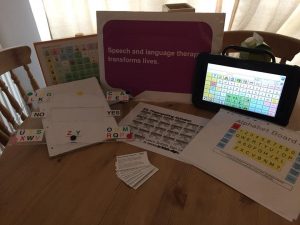No Voice (AAC) Challenge
On the week of the 6th November 2017 Speech and Language Therapy students took part in a No Voice Challenge. For one day of the week they used a range of Alternative and Augmentative Communication aids instead of speaking with the aim of raising awareness of the importance of Speech and Language Therapy as part of the Giving Voice Campaign. The Regional Communication Aid Service kindly lent us high tech tablets with symbol programmes installed, e trans frames and communication charts. Other AAC approaches adopted included VOCA apps on our phones, symbol apps, signing, writing, alphabet boards and drawing.
Below are some comments from those who took part:
What AAC/ strategies did you use the most?
- Typing on a laptop/ phone was the easiest by far- hard to imagine how tough it must be for our clients who can’t type if they don’t have the language/literacy/ motor skills.
- Signing and gestures came naturally to me as I gesture a lot when I speak anyway. When gestures or signing failed, I tended to write. My hands were essential for my ‘voice’. I couldn’t reply anytime someone spoke to me when I had my hands full such as walking down a corridor.
- The E Trans frame was so difficult! It took such a long time to use. If it was my only means of communication I would say very little and be quite depressed.
How did you feel?
- Really frustrated! I feel like that is a word we use a lot but it is TRUE!! Also felt rude when I couldn’t say excuse me/ thank you and people didn’t see me signing. Isolated from conversations.
- Makes you feel like not bothering because it is so much effort to get your message across.
- Sometimes I just gave up when communicating because it was so hard. I felt isolated, frustrated and self-conscious. By the end of the day I was emotionally and mentally drained. At 5pm I went home and accidentally fell asleep!
- When you have nothing and all your contributions are minutes after the original point was made in conversation- frustration builds.
How did others react to you?
- I got bad vibes from some people who I couldn’t say “excuse me” to. Speech therapy students were quite good at waiting for you to finish what you wanted to say but some non-SLTs really weren’t.
- I was appreciative of people adapting their communication for me e.g. being patient and waiting to respond via my VOCA app.
- I went to Subway with my order on a whiteboard and they thought I was crazy. They may my order though. It was so time pressured as there was a huge queue behind me.
- As there was nothing visible about not being able to speak people are surprised when they realise you’re not talking.
How did it impact your participation?
- Conversations often moved so quickly that by the time I had written what I wanted to say the conversation had already moved on. It was so hard trying to convey something complex in a limited time span. I couldn’t do it- I struggled.
- I couldn’t really contribute in class. A lecturer asked me for an answer and I couldn’t reply.
- People walked off when I was trying to communicate, I couldn’t get people’s attention without tapping them on the shoulder. It was very hard to participate in group conversations because the conversation would change before I could input. I didn’t realise how quickly people give up trying to have a conversation when you can’t talk back.
- Anything more than a basic yes/no or good/bad response required writing, gesturing, typing to using an app which takes much longer.
- People spoke to me less.
- I couldn’t sing in the shower and small things like that have a big impact!
How will this experience influence how you work with clients?
- When they say they’re tired I can understand why. Giving adequate time means more than you think. Communication difficulties would be a nightmare- lots of strategies were needed.
- I will give them loads of time to reply and not sit over them like I’m being inpatient. I understand why my non-verbal client didn’t want to use the iPad app- it was so frustrating.
- I will certainly make sure I am aware of my own body language, pitch etc.
- I think it’s help me grow in empathy and compassion towards them, experiencing in a really small way just something of how difficult it must be. I’ve grown in respect for how they keep going after understanding a little more of what a challenge having a communication difficulty must be.
- I can understand more deeply the importance of groups such as NETA where service users can meet others experiencing similar communication difficulties. For me, it really helped being around others who were taking part in the challenge and who could understand the difficulties.
We learnt a lot through the No Voice Challenge and would recommend it to anyone working with people with communication difficulties. It has helped us gain a small insight into what life is like for some of our service users. We’d like to thank everyone who sponsored us and helped us raise £532.13 (including Gift Aid at time of writing) for the Percy Hedley Foundation.
